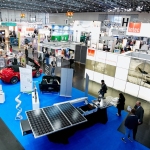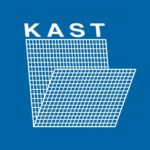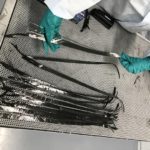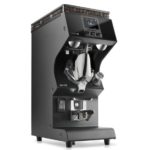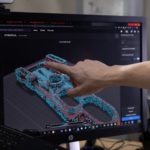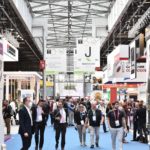They’re light, stable, corrosion-resistant and low-maintenance: thanks to these properties, prospects are excellent for the material and thus also for the European composites industry. Automotive engineering, aerospace and construction have been the main drivers propelling fibre composites. Production quantities of glass-fibre reinforced plastics (GFRP) – which with a market share of 95 per cent still represent the largest materials group – once again increased last year, by two per cent over the prior year. Germany, Europe’s largest composites market, even saw a slightly above-average production increase of three per cent. Overall, 1.12 million metric tonnes of GFRP were produced, according to the findings of the current 2017 composites market report issued by the German Federation of Reinforced Plastics AVK. “Composites as a material and the entire associated industry still hold enormous potential, which in many cases has yet to be fully revealed”, says Dr. Elmar Witten, managing director of the AVK. The companies themselves definitely expressed an optimistic view of the future. According to the latest edition of the semi-annual composites market survey in Germany, just one per cent of respondents expect commitment to decline, while just under half of them are counting on their company’s commitment in the composites field to increase.
Stuttgart welcomed 406 exhibitors and 8,342 visitors
This positive market outlook was reflected as well at this year’s COMPOSITES EUROPE, which as Europe’s leading trade fair in the largest market puts on display the entire manufacturing process from raw materials to semi-finished goods to finished components. With a total of 406 exhibitors from 28 countries and 8,342 visitors, this year’s COMPOSITES EUROPE fell just short of last year’s result (2016: 8,622), but it could enter a wide international reach. 40 per cent of visitors came from outside Germany. While most of them hailed from other European countries, some visitors journeyed to Stuttgart from faraway places – from Brazil, for example, the US and Canada, and even from Japan, New Zealand and South Africa. All told, COMPOSITES EUROPE visitors represented 63 nations. Dennis Baumann, the head of global sales at SGL Group, confirms this observation first-hand: “We meet customers from Germany, Europe and even the US, China and India here. There’s a lot of momentum, including in application areas such as construction and mechanical engineering.” For Hans-Joachim Erbel, CEO of organiser Reed Exhibitions, this unambiguously validates the decision to move COMPOSITES EUROPE to Stuttgart: “The proximity to the automotive industry and the aerospace sector as the drivers of the composites industry meant an additional boost for the trade fair.” While COMPOSITES EUROPE has thus far alternated between Düsseldorf and Stuttgart, it will now be held in Stuttgart every year. Exhibitors welcome this decision, as emphasised by Hexion’s corporate marketing communications director Michael Stahl: “The decision in favour of Stuttgart was absolutely correct. The trade fair was characterised by high-quality visitors, noticeably higher demand and excellent talks with customers like Mercedes and Airbus.” Estibalitz Arregi, the composites unit manager of Spain’s Fagor Arrasate, seconds that notion: “Stuttgart is an exciting location for us to handle our business, most of which takes place abroad. That’s why we’re planning on returning next year and deepening our networking efforts.”
Rising significance of multi-material solutions
The benefits of fibre composites are most impactful in multi-material lightweight construction. That’s because it is now clear that the demands of modern lightweight construction can no longer be met by a single material; finding the best solutions instead requires hybrid lightweight construction. Serving as the interface between metal and fibre composite technologies at COMPOSITES EUROPE is the Lightweight Technologies Forum, which made its debut back in 2016. “With this cross-material forum, we created a new format in order to bring together the composites industry and the application industries in integrated and hybrid lightweight construction”, says Olaf Freier, the event director of COMPOSITES EUROPE. Innovations are more important than ever these days, especially in integrated lightweight automotive engineering. The current market study titled “Lightweight Construction as Innovation Driver” illustrates that point. Unveiled in Stuttgart, the paper lays out the status quo and explores the trends and future challenges of multi-material lightweight construction in the automotive sector. It concludes that politics and end customers are the biggest drivers of lightweight construction right now. However, the consistent implementation of lightweight construction solutions fails due to supplier- and manufacturer-imposed hurdles, according to the study, which was designed and implemented in cooperation with Automotive Management Consulting GmbH (AMC). “Lightweight construction is particularly important for the international competitiveness of German industry and thus for ‘Made in Germany’, and lightweight construction as a key innovative technology strengthens our leading international position”, says Dr. Elmar Witten, the managing director of the AVK and the industry association Composites Germany, and one of the initiators of the position paper “Germany must become the leading lightweight construction supplier”. A total of 16 industrial and lightweight construction associations signed the position paper a few weeks ago.
COMPOSITES EUROPE: Now in Stuttgart every year. The next COMPOSITES EUROPE will take place in Stuttgart from 6 to 8 November 2018. www.composites-europe.com
Exhibitor and partner testimonials
“Composites as a material and the entire associated industry still hold enormous potential, which in many cases has yet to be fully revealed.”
Dr. Elmar Witten, Managing Director, AVK
“The proximity to the automotive industry and the aerospace sector as the drivers of the composites industry meant an additional boost for the trade fair.”
Hans-Joachim Erbel, CEO, Reed Exhibitions Deutschland GmbH
“The decision in favour of Stuttgart was absolutely correct. The trade fair was characterised by high-quality visitors, noticeably higher demand and excellent talks with customers like Mercedes and Airbus.”
Michal Stahl, Director Corporate Marketing Communications, Hexion
“Stuttgart is an exciting location for us to handle our business, most of which takes place abroad. That’s why we’re planning on returning next year and deepening our networking efforts.”
Estibalitz Arregi, Composites Unit Manager, Fagor Arrasate, Spain
“We meet customers from Germany, Europe and even the US, China and India here. There’s a lot of momentum, including in application areas such as construction and mechanical engineering.”
Dennis Baumann, Head of Global Sales, SGL Group
“With the Lightweight Technologies Forum we’ve created the framework for bringing the composites industry and application industries even closer together in order for them to jointly develop fitting solutions for new lightweight construction technologies.”
Olaf Freier, Event Director, COMPOSITES EUROPE.
“Lightweight construction is particularly important for the international competitiveness of German industry and thus for ‘Made in Germany’, and lightweight construction as a key innovative technology strengthens our leading international position.”
Dr. Elmar Witten, Managing Director, AVK and Industry Association Composites Germany
About COMPOSITES EUROPE:
COMPOSITES EUROPE, the European Trade Fair and Forum for Composites, Technology and Applications, showcases the full range of fibre-reinforced plastics, from raw materials to processing methods to lightweight construction innovations in automotive engineering, aerospace, boatbuilding, wind energy and construction. COMPOSITES EUROPE is organised by trade fair organiser Reed Exhibitions in cooperation with the European industry association EuCIA and the trade association Composites Germany, a coalition whose members include the industry associations and clusters AVK, CCeV, CFK-Valley Stade and the VDMA Working Group Hybrid Lightweight Technologies.



